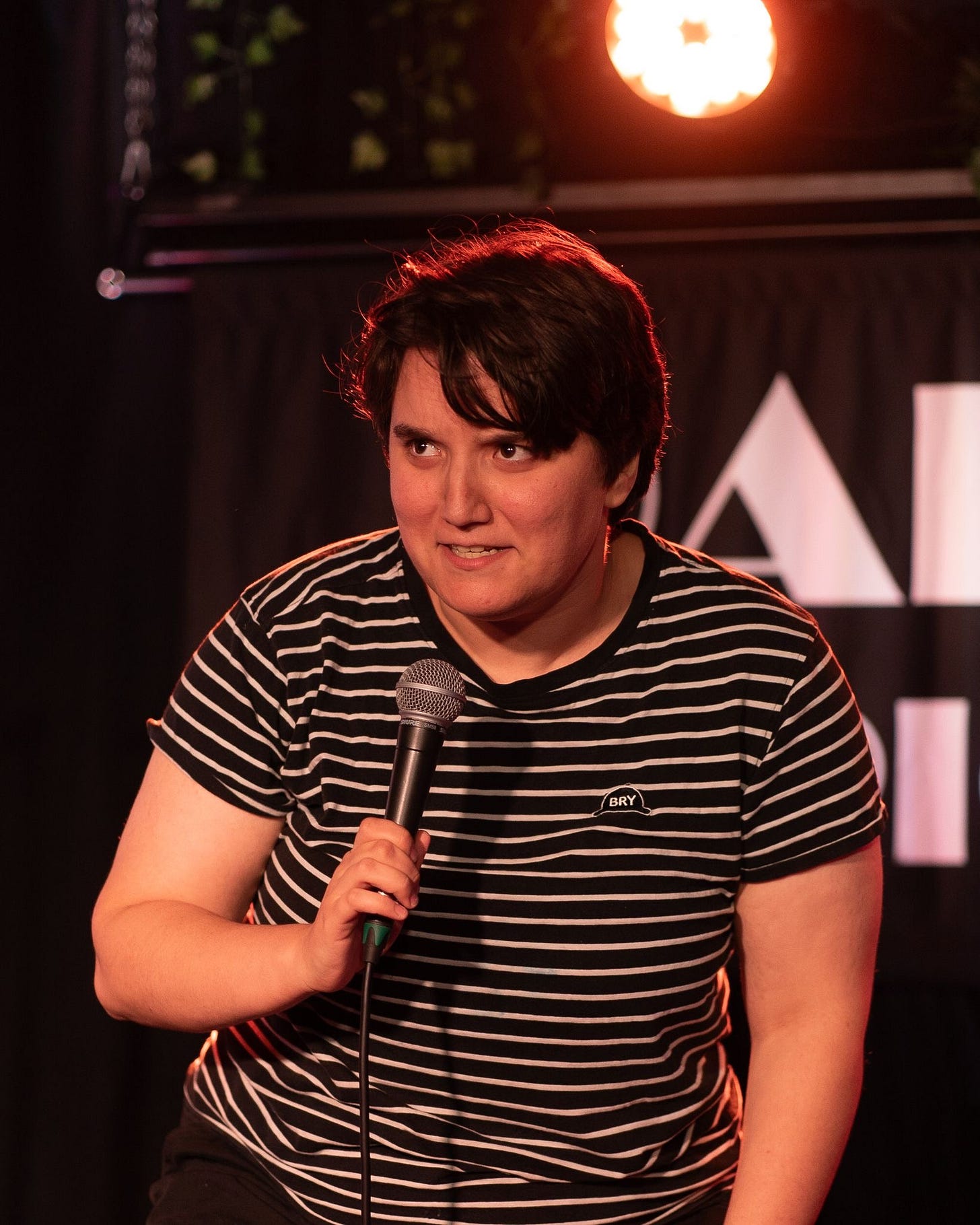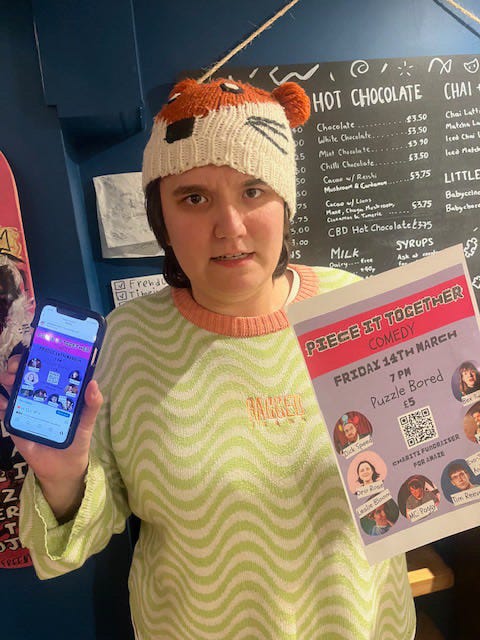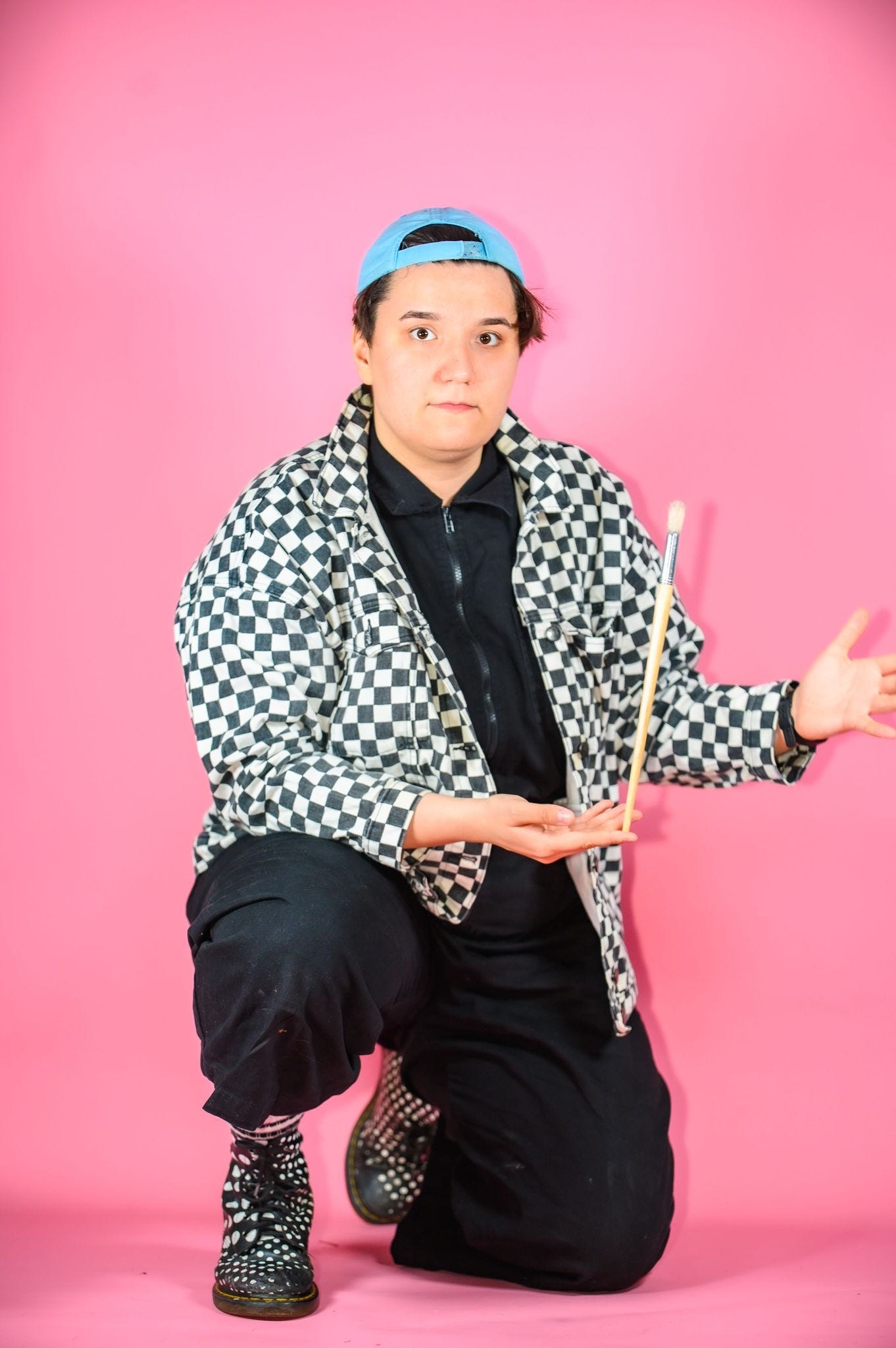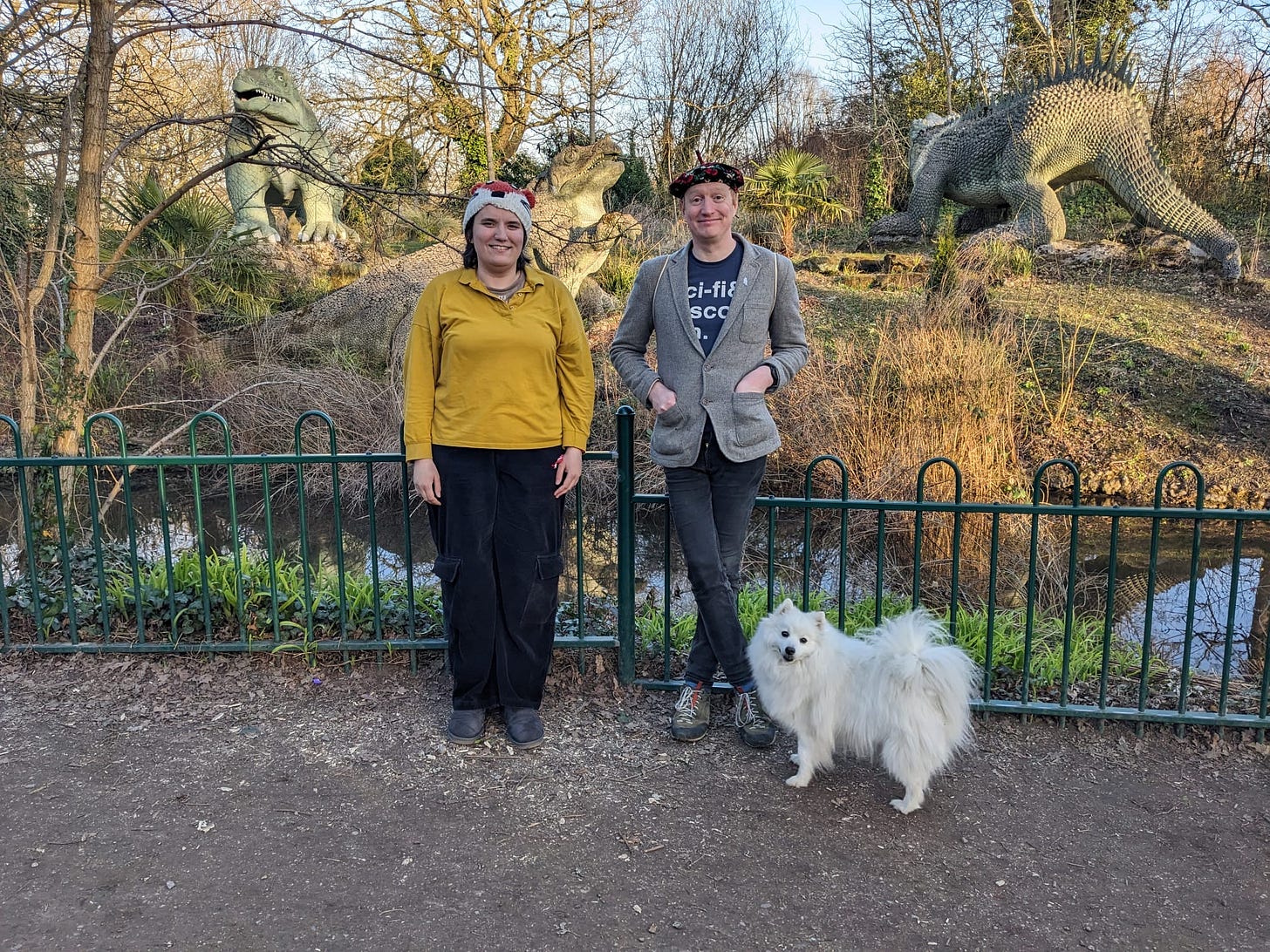‘Comedy is simple, but not easy’: an interview with Brighton comedian Paggy Gacheva
The motormouth neurodivergent comic talks improv, the magic of performance, and dealing with audience assumptions

Paggy is one of my favourite comedians around at the minute, and has won admirers EVEN MORE important than me, such as leftie stand-up legend Mark Thomas, for her seemingly carefree but actually carefully-thought-through material.
Like all the funnest alternative acts she’s also quite tricky to pin down. There’s some stand up in there, but also plenty of improv and lashings of character comedy.
I caught up with Paggy on a beautiful sunny afternoon in Crystal Palace park1 along with a dog called Kirby to have a proper ramble chat about her life, her work and her ideas.
Hi Paggy!
Who are you and why are you talking to me?
Hello James. My name is Paggy and I’m a writer and comedian. I do comedy in terms of stand-up, character, sketch, and improv sometimes as well.
Me and you met at Extra Topping a couple of years ago and we just went off. There was this synergy.
There was.
We’re here to find out about my work and what I do, because my journey into comedy is perhaps a bit unorthodox.
Looking at the inception - the roots of Paggy as a comedy edifice - how did you first get into performing?
Great question James. I’ll start by saying how I didn’t get into it. A lot of people who get into comedy have always been interested in performing. I did a couple of plays at school, but I was never very much a performer or a people person, which might surprise people.
I was very reserved and kept to myself, but that wasn’t really me at the time. And once I started unmasking I thought more about who I actually am, about I want to come across and how I come across naturally.
But how did I get into comedy? It was all thanks to a research study.
Go on.
I really wanted to do improv, and the day after I said this I got forwarded an email about a research study about improv.
The title of the study was: “How does taking part in improv affect the anxiety levels in autistic adults”. As I am both an adult and autistic - most of the time - I was like yes, I’ll do it.
It was an online study with Dr Nathan Keates, and the study has now been published!
That led via an online jam to me meeting Paul Wady and joining an all-autistic theatre group now called Neurospace Theatre.
We did a showcase at Barons Court theatre, and I finished it off with a fifteen minute set about comedy.
Well, a comedic set. It wasn’t *about* comedy. Hopefully.
I started gigging pretty consistently in 2022, in terms of stand up, and then did my solo show Stimmicanto to critical acclaim.2
I’ve really always just done my own thing and not had a career path or done what was expected of me, which was really freeing.
People told me you have to do your tight five, your tight ten, your tight twenty, then you move to your solo show, which is a valid path and works for a lot of people.
But I just wanted to do comedy, and that can be interpreted as stand-up, that can be interpreted as improv, but it’s more the joy of performing and sharing that with a live audience.

Talking of the tight five and not following a standard path, you mentioned the first thing you did was fifteen minutes long. How did that go?
It was more comedic theatre than strict stand-up, so there were audio-visual elements where I talked to my brain! And that fifteen minute set was the basis for Stimmicanto.
Starting off with fifteen minutes is very generous and I’m very grateful for that.
Fast forward and I’m doing Brighton open mics and those are five minutes. I didn’t feel stifled but it definitely was a change of pace. I wasn’t starting from zero but I realised fairly quickly that I can do this, that I’m going to keep doing this, but I want to do my own thing.
I’ve really enjoyed doing runs of Stimmicanto. I mean, no one told me I could do a solo show, I just decided I wanted to, and gave myself that space.
In comedy it’s very important to network and meet the people you want to meet, and do the gigs you want to do, but no one’s going to approach you and go, “do you want to do a solo show?” at an early stage and you have to sometimes take liberties.
I’m just trying to follow my own path and experiment with what comedy means to me.
I’m interested in the masking versus being on stage experience. Was it liberating?
Like you I also feel more comfortable on stage than off stage, and more in control but also more free to be myself.
Everyone says “be yourself”, but it’s very hard to be yourself if you don’t actually know who you are.
If you’ve been masking for years and years, the masking become subconscious. Before I got my autism diagnosis in April 2019, I was masking but I didn’t have the word for it or know that’s what I was doing, because it was so ingrained in me.
And then after the ADHD diagnosis in January of this year - surprise to me but maybe not to anyone else! - …
What was the question again?
When you became aware of masking, where did that fit in regarding your on and off stage personas?
On stage I try to amplify the things about my personality. Sometimes I come across as a very intense person, and I use that to my advantage in terms of how I communicate to the crowd.
A lot of my funniness isn’t necessarily jokes, it’s my mannerisms, my eye contact with the audience, my physicality.
I have a character called Paintbrush Paggy, who is an evil game show host. The idea for the character was just amplifying the things about myself I really care about and alienating the audience for not caring about them as much as I do.
I love positive alienation, where the audience isn’t relating, but they’re both relating and not relating - “wait, I should care more about this”.
[Shuffling noises as James gets up off the log upon which this interview is taking place]
I was trying to take a photo of you with the dog. Sorry to interrupt.
A lot of people find grief in a late [autism] diagnosis. “I wish I knew earlier”: I had that for a long time, even though I was eighteen, which isn’t that late.
I’m grateful it happened that way because people weren’t able to tell me what I can and can’t do before I had figured that out for myself.
Having this scrappy, DIY approach to comedy has helped because no-one has said oh you’re not experienced enough to have a solo show.
What’s helped me to unmask is finding my tribe, and finding my people.
I didn’t know about your late diagnosis, which in itself is very interesting.
I’m thinking of whether performance is a type of liberation. I guess I’m wondering how important getting up on stage was to you figuring yourself out.
I’m really greateful I started with improv. Throwing 500 ideas out and seeing which one sticks. Having that liberation of accepting everything but not necessarily holding value to anything. Which is helpful for that mindset that comedy is about churning out ideas, and 99% of things are going to be bad.
It’s healthy to be less precious with my ideas. You have to love your material and write what’s funny to you.
And the material only matters to an extent, because it should serve you rather than you serving the material.

[Paggy’s character] Paintbrush Paggy, for example, is very improv based, and is very dependent on what the audience says. But it also pokes fun at a lot of stand-up tropes whilst at the same time following those same tropes.
Like, in the act people have to select a specific answer from a box, and I’m playing with the illusion of choice. I’m saying this is a suggestion from the audience but actually I wrote everything before the show.
It’s about playing and being silly and being able to make a fool of yourself. The most important thing is it’s fun and not trying too hard to be too clever - that stuff follows organically.
I never said I wanted to be an alternative comedian, that’s just something that I am!
We’re more keen to put things into boxes now, especially when it comes to stand-up. Do you think things are getting better?
There’s still a gap between inclusion on stage and inclusion off stage.
People say they like my act but then they’ll perceive parts of my personality or how I come across as part of the act.
And ok, sometimes those parts are amplified for comedic effect. But sometimes people seem to think I’m autistic as a character, and that it’s not who I am.
The question is: how does comedy become more inclusive in terms of the experience you have as a performer?
With getting that gig, and how you’re treated at that gig?
It almost sounds like some people aren’t giving you enough credit for how sophisticated what you’re doing is.
Unfortunately I sometimes feel the choice is acting more autistically or being taken seriously.
The question is how can you be autistic in a way that you are autistic and still climb that social ladder and have that communication off stage. Because I love talking to people but… it’s how people see you sometimes.
Is this in terms of networking, or in terms of people being a bit weird about you?
Sometimes it’s a case of people being put off by enthusiasm or just being excited. You have to be happy you’re doing that gig but you don’t want to come across as too happy to be doing that gig. And it’s how you see other performers: you see them as peers, but the line is blurry about seeing someone as a comedy friend versus a friend-friend.
You’re based in Brighton, but you also gig in London and beyond. Do you perceive any difference in these scenes?
I like both but what I like about mostly doing London gigs at the moment is there’s much more of an unknown in what the audience is going to be.
Brighton audiences can be very similar, but there’s less expectation to deliver polished stuff. There’s more space to do something off the wall and genuinely new stuff.
Can you let me know what you’ve got coming up gig wise?
Yes! There’s an excellent neurodivergent-friendly puzzle cafe in Brighton called Puzzle Bored. On Friday I’m doing a gig there at 7pm called Piece It Together, raising money for Amaze3. If it goes well hopefully it’ll become a monthly gig.
I’ve booked a bunch of my stand up and alternative comedy friends, so It’s going to be a nice concoction off offbeat AND… beat… comedy.
You’ve got lots of jigsaw pieces that you’re putting together into one perfect picture of comedy.
And they’ll be all jigsaw pieces from different puzzles which will somehow fit together.
And that’s the magic of life comedy, we’re going to somehow figure it all out together.
Also the week after I’m doing a show called Laughter Lounge, which I’m marketing as a neurodivergent plus comedy night. And I’m hosting!
It’s at the Railway Club in Seven Dials!
Oh, and you asked me what next. Well I’m working on my next show, which has the working title “My name is Paggy and so is yours”.
It’s a good title.
Thank you. The start of the blurb is something like, “Paggy is the best named comedian called Paggy. Is your name Paggy? It will be by the end of the show.”
Perfect.
The whole point of the show is, I’m not trying to assimilate by fitting in, and I’m not trying to accept who I am, instead I’m trying to feel more included by making everyone me.
It sounds very narcissistic, but it’s more… what if everyone could just be me, then things would be a lot simpler!4
Love it. Thanks Paggy!
We sat on a log under some trees. It was lovely, though the parakeets were out of control.
In the recording Paggy says “to critical acclaim” in a silly voice, but it’s true, and this is classic English self-deprecation that doesn’t come across properly when written down. Interviewing Paggy was a lot of fun.
Paggy is also doing a 10K run for the same cause - JustGiving link here!
This, I should stress, is a joke, and not narcissistic at all.





